Table of Content
Are you concerned about your internet privacy? Public information databases, such as Radaris, might disclose your personal information, making you vulnerable to identity theft and hacking fraud. South America had 6.9 million compromised accounts in 2023, ranking fourth among all regions. But do not be afraid! This guide will walk you through the processes for opting out of Radaris and protecting your personal information from prying eyes.
Key Takeaways
- Operating as a data broker, Radaris collects and shares diverse personal information, including address history, age, employment records, and criminal histories.
- To protect privacy, Radaris requires users to follow a specific opt-out process, completing a form and email confirmation to remove their information from the platform.
- Radaris.com's unique approach provides comprehensive profiles by combining publicly available data with digital footprints from social media and the internet.
- Experience the empowering impact of PurePrivacy, eliminating entries from data broker databases and enhancing online privacy with finesse.
What is Radaris?
Radaris is a people search site or search engine similar to Google or Bing. This includes data such as contact details, residential addresses, employment history, criminal records, social media profiles, and more. The platform is often used by individuals and businesses for purposes such as background checks, identity verification, and people searches. While it can be a useful tool for obtaining comprehensive information quickly, it also raises concerns about privacy and the ethical implications of making such detailed personal information readily available online.
How Does Radaris Gather Your Information
Radaris collects information about you from a variety of sources:
Public Records
This is a major one. Radaris searches through publicly available court documents, property records, and voter registration lists. This information may include your name, age, residence, phone number, and possibly some criminal history.
Social Media
Radaris searches social media networks for information about you. This might include public posts and your profile information, such as your education and professional experience.
Other Online Sources
Radaris can get information from other websites, such as data brokers and public directories. These sources may contain information such as your email address, family, or even professional licenses.
How Accurate is Radaris Information Database?
The accuracy of Radaris has been an important point of discussion. While some information may be correct, there is always the possibility that it is out of date or incorrect. It is vital to treat the information with caution and consider verifying it with other credible sources.
Having incorrect information available on radaris is also dangerous because it can be highly detrimental, leading to personal and professional consequences such as damaged reputations, hindered job prospects, and strained relationships.
How to Opt-Out of Radaris Manually
To exercise your right to privacy, you can usually start the data removal process on Radaris by going to their website and accessing the opt-out page. Follow these steps:
Step 1: Enter the name and state in the search bar. Hit "Enter" on the magnifying glass
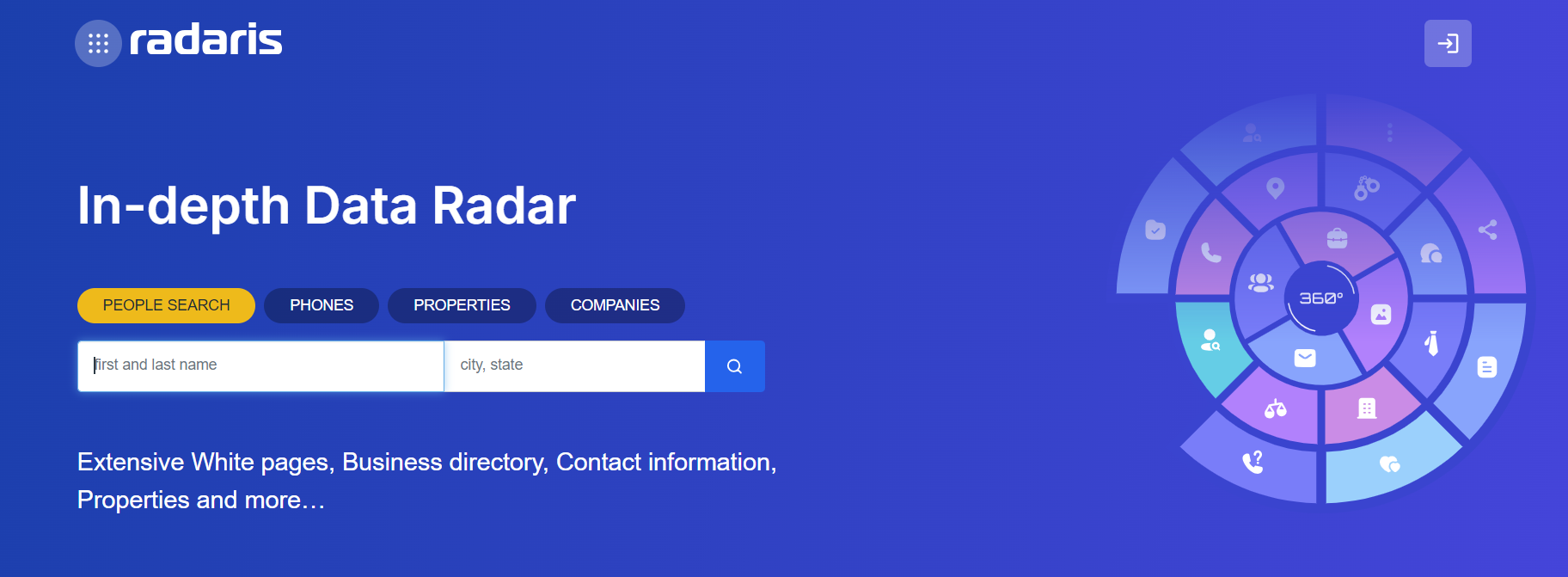
Step 2: Select the one you want and click "View Profile."
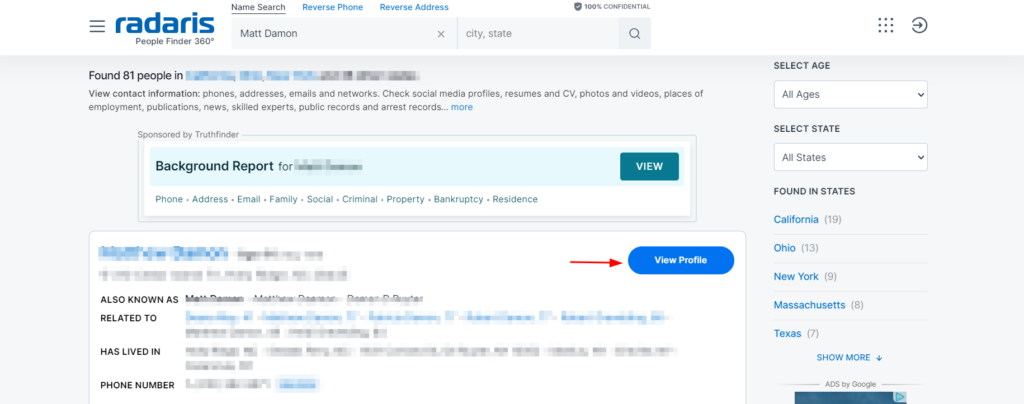
Step 3: Control info once the profile appears.
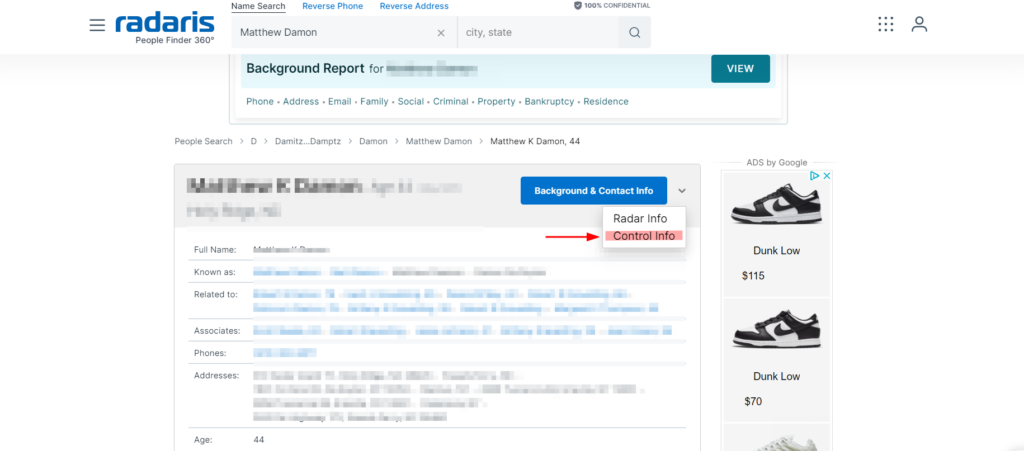
Step 4: Control info to proceed.
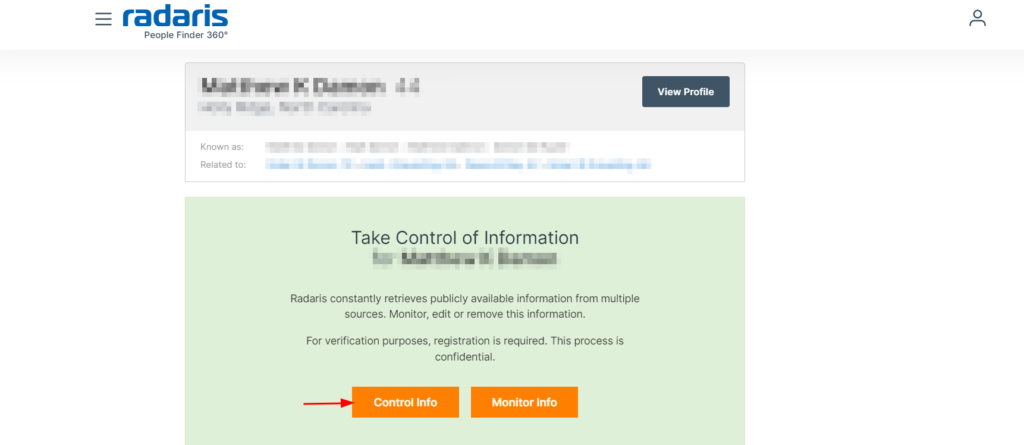
Step 5: Enter your full name and email. Verify you're human. Hit "Send Request".
Step 6: Verify your email.
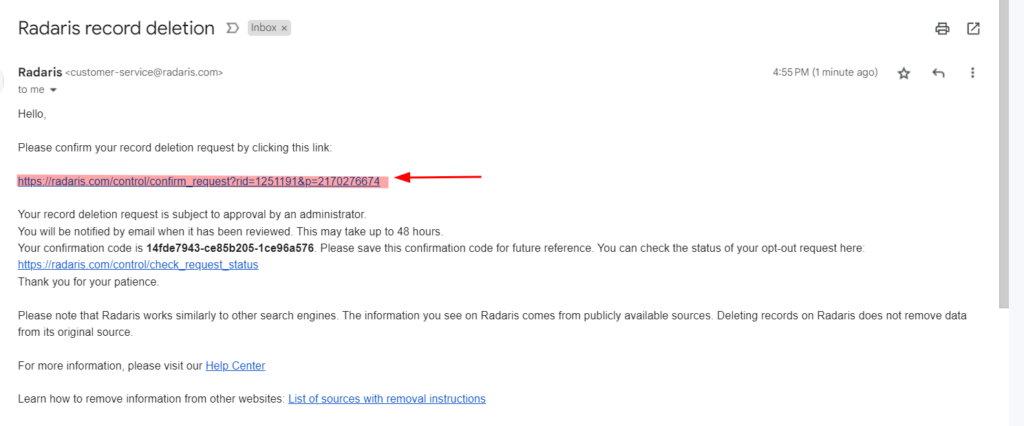
Step 7: Your request has been sent.

Manual Opt Out vs. PurePrivacy Opt Out: Which Opt Out Procedure Is More Convenient?
- Takes a lot of time; one needs to fill out forms, go to the websites of each data broker, and maybe wait for verification.
- Can be difficult to identify the specific data brokers that store your data.
- The verification procedure differs for each data broker; some might not provide it, so the success of the removal is dubious.
- It needs access to many websites, some of which may have intricate processes and distinct data needs.
- A simplified procedure that sends opt-out requests to over 200 brokers at once, greatly reducing processing time.
- Searching the web for data brokers who are likely to hold your information increases the likelihood that your information will be removed from a wider range of sources.
- It offers a dashboard for tracking removal requests, so you may check their progress and contact brokers as necessary.
- An easy-to-use interface streamlines the procedure and requires less data entry.
Alternative way to opt-out from Radaris:
Radaris' also offers a dedicated support team to address any inquiries, grievances, or issues. SO you have any issue while opting out so you can reach them via telephone at 855-723-2747 during their operating hours from Monday to Friday. If you prefer written communication, you can send an email to [email protected].
More to explore in Opt-Out
- Epsilon.com Opt Out
- Experian Opt Out
- Equifax Opt Out
- Epsilon.com Opt Out
- Acxiom Opt Out
- CoreLogic Opt-out
- Apollo.io Opt Out
- RocketReach Opt Out
Frequently Asked Questions
-
Does Radaris comply with data protection laws?

Radaris strongly emphasizes data privacy and security, demonstrating a commitment to adhere to relevant laws, including the California Consumer Privacy Act (CCPA), the Fair Credit Reporting Act (FCRA), the General Data Protection Regulation (GDPR), and the UK Data Protection Act (DPA).
-
How long does it take for Radaris to process an opt-out request?

Radaris does not specify a specific timeframe for processing opt-out requests. Processing times may vary based on request volume and internal procedures. For the latest information, it is recommended that you check Radaris' website or contact their customer support.
-
Will requesting a Radaris removal work?

Radaris provides an opt-out process for removing your information, however, it may require follow-up if necessary. This approach should delete your profile, but it may not remove mentions of your name from other people's profiles. Consider looking at reputation management services for a more thorough approach.
-
Is opting out from Radaris a one-time process?

Yes, you should only opt out of Radaris once. Once you submit your request through their website and confirm it via email, your profile should be removed within 48 hours. However, it is crucial to know that Radaris collects information from public sources, so your information may reappear if it is republished elsewhere.
Take Care of Your Private Data!
Opting out of Radaris may reduce the quantity of personal information available to public record search providers. This can be advantageous for those who respect their privacy and want to manage access to their data. However, it is critical to balance the possible benefits against any disadvantages, such as the possibility that certain companies will use Radaris for verification purposes.






